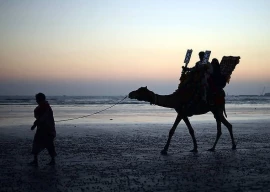
This was the crux of a two-day international conference titled “National issues and national security lessons in the region”, organised by the Institute of Strategic Studies Islamabad (ISSI) in collaboration with the United States Institute of Peace (USIP), Washington DC, and the Hanns Seidel Foundation (HSF) on Wednesday.
University of Karachi Faculty of Social Sciences Dean Dr Moonis Ahmar said Pakistan’s internal security challenges and issues emanate from ethnic, lingual, cultural, sectarian and religious contradictions. He said unjust distribution of resources and development funds and energy issues were also contributing to wrangling among provinces.
Director of the Centre for Public Affairs, India, Dr Ajay Mehra said in a national security discourse, prominence should be given to human development by striking a balance between state security and human security.
He said that Pakistan was a crucial strategic state in South Asia and security of the region was inter-connected.
He argued that regional states should not simply rely on hard power instead they should take into account wider aspects of sustainable national security.
“The South Asian region is far behind in international human development and governance. There is need to focus on peoples’ security which include economic, employment, food, health, education, environmental and other security issues and basic livelihood.
Dean of the school of economics, Afghanistan, Dr Najeeb Azizi, said the United State’s role in Afghanistan regarding national security, political stability, economic growth and development was crucial.
Quaid-i-Azam University Associate Professor Salma Malik spoke on various dimensions of security.
Fellow at Quaid-i-Azam University Dr Ishtiaq Ahmed gave a comprehensive and insightful presentation on Pakistan’s ‘regional pivot’.
Ambassador (retd) Tariq Osman Hyder gave an insightful presentation on image and diplomacy in the context of Pakistan’s place in the international community. He also highlighted key interests in terms of Pakistan’s external policy, such as Pakistan’s aspiration to play a central role within the region to become a relevant player in the international arena and maintain a strategic balance in South Asia by projecting and maintaining its own independent position. Ambassador (retd) Khalid Khattak gave an appraisal of Pakistan’s ties with Russia within the context of global, regional and bilateral perspectives. He also said although Indo- Russia ties in the past overshadowed Russia’s ties with Pakistan, the current state scenario offers opportunities to both Pakistan and Russia to promote ties, particularly in the wake of India’s policy to diversify its sources and market for Indian arms.
Dr Mahendra P Lama of the Jawaharlal Nehru University, New Delhi, shed the light on the regional connectivity in term of energy security. ISSI Research Fellow Faraz Hameed shed light on the issue of political economy of illicit trade in Afghanistan in light of its bilateral trade with Pakistan. He said that illicit trade has been exacerbating conflict between Pakistan and Afghanistan
Published in The Express Tribune, November 27th, 2014.








































COMMENTS
Comments are moderated and generally will be posted if they are on-topic and not abusive.
For more information, please see our Comments FAQ